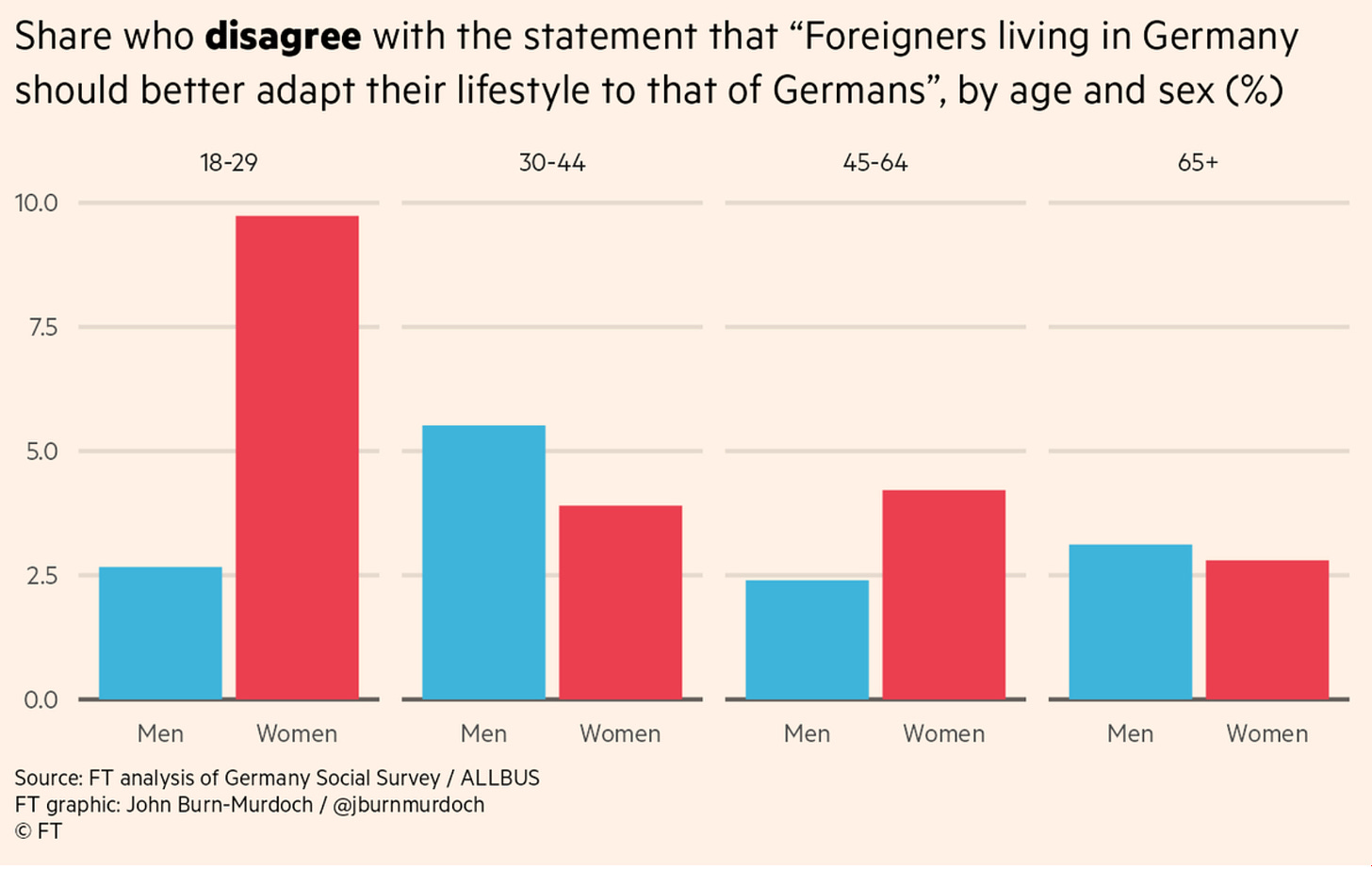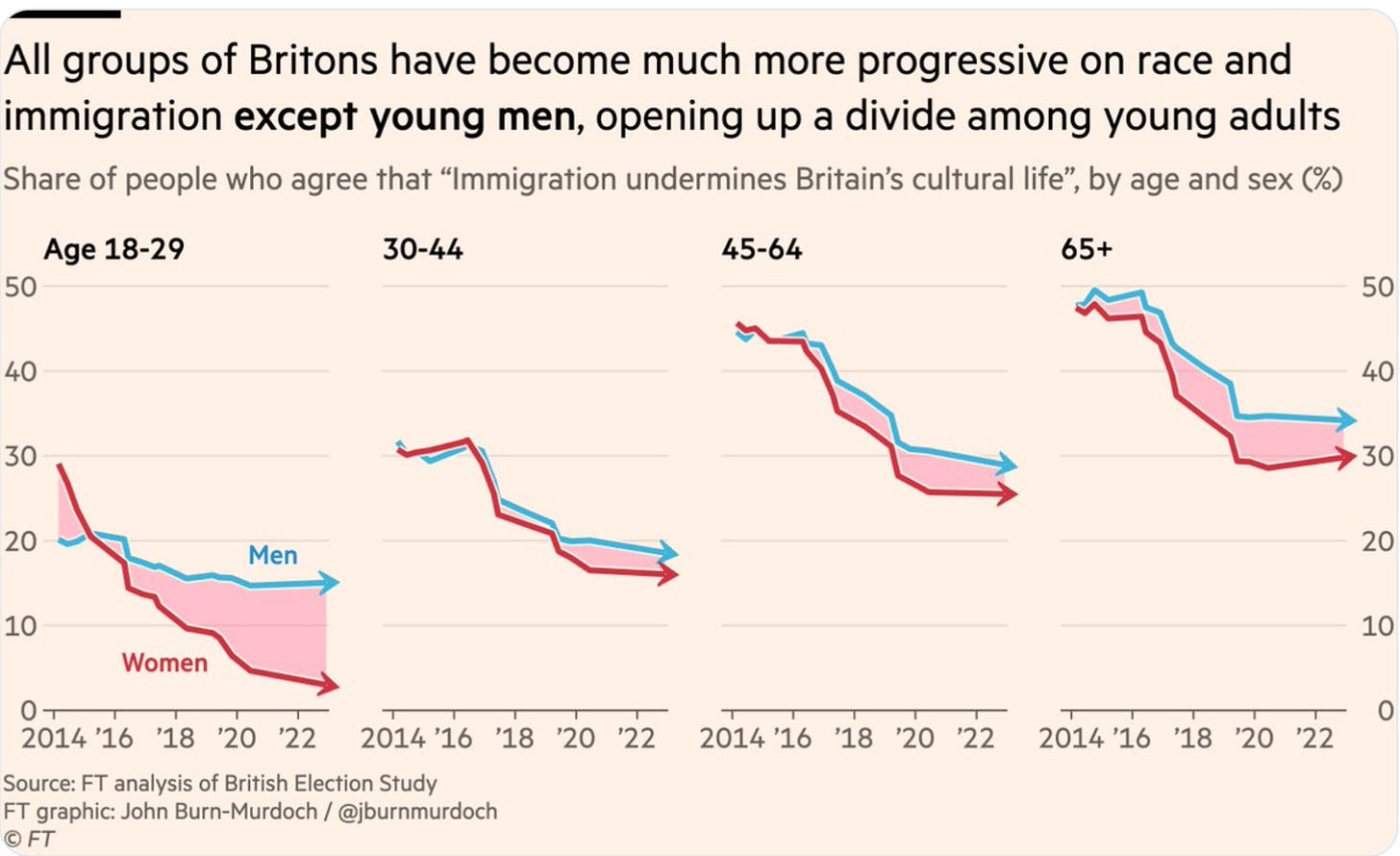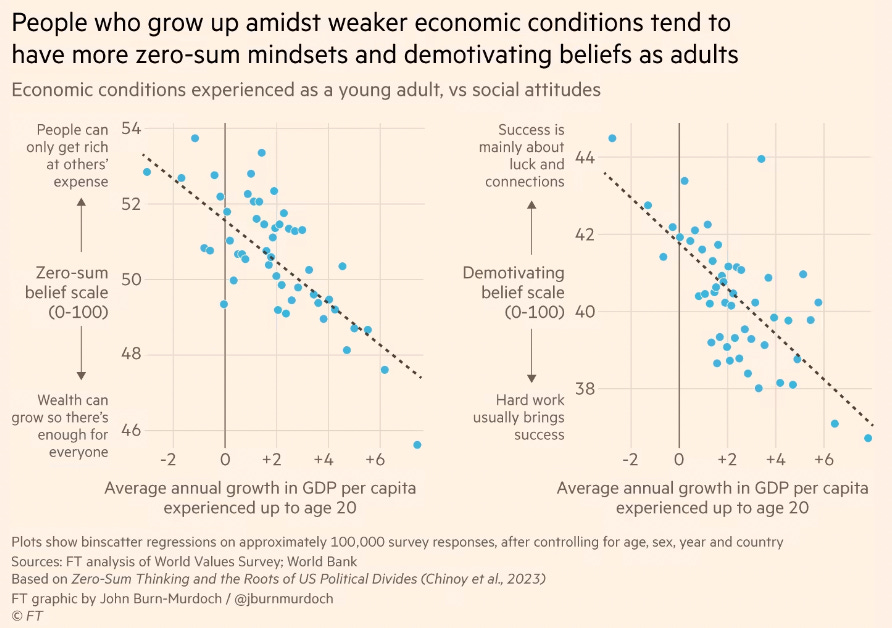This is the second of three pieces on gender, politics, and young people. Part 1 is here.
—
There is some unfinished business from the previous piece on the gendered of young people. ‘Young’ is 18-29.
So let’s start, briefly, with the politics of young women, radicalised in the last decade (in the UK, Germany, and the US), and the last half decade in South Korea.
In his FT piece and associated ex-Twitter thread, John Burn-Murdoch notes that this radicalisation isn’t just about gender issues. He uses attitudes to immigration as a measures for this:
Young German women have become markedly more progressive on attitudes to immigrants, while young German men are more conservative on this than their elders.
Here’s the chart:

He sees a similar trend in Britain: well, sort of. This is what he writes:
All groups of people, young and old, men and women, have become more liberal on race and immigration except young men.

He calls this ‘remarkable’, although I think that British young men are getting a bit of a hard time here. Yes, young women have become almost completely progressive on immigration—the line goes almost to zero—and other cohorts have made similar progress, whereas the views of young men are much as they were six years ago. But they are still more progressive on the issue than any other cohort, except for young women.
It’s worth going back to the summary chart that I shared in Part 1:

Looking at young men in Germany and the USA, they are around the average for the country as a whole, between being conservative and progressive, while in the UK there has been only been a divergence in political views between young men and young women. I’ll come back to this, because I think there’s something salient here.
But the most detailed exploration of these attitudes is in the piece by Alice Evans that I referenced in Part 1—I didn’t have space to get to her discussion of young men then.
In the section on the less progressive views on young men, she proposes four hypotheses, and then tries to test each of these:
- Feminised public culture
- Economic resentment
- Social media filter bubbles
- Cultural entrepreneurs, like Andrew Tate?
Feminised public culture
Summarising her argument: It is true that we have seen a more feminised public culture since the late 1990s, notably in some reasonably visible areas such as media, if not in other areas such as business.
As early as 1997, most of the editorial and sales executives at Time Warner were women . By 2000, women held 50% of US book copyrights . By 2020, they authored the majority of new books. Their readers were often female.
Just typing out this makes you feel that this isn’t a strong hypothesis. It might explain some of the emerging conditions that make young women more progressive, but it doesn’t explain the increasing conservatism of young men.

Economic resentment
On economics, Evans writes:
A wealth of research suggests that economic stagnation fuels sexist resentment, xenophobia, far-right voting, and zero sum mentalities.
She cites a 2022 paper by Off, Charron and Alexander, which looks at ‘modern sexism’ among young men in Europe. They found that younger men are more likely to agree that
“Advancing women’s and girls’ rights has gone too far because it threatens men’s and boys’ opportunities”,
and that such resentment “is strongest among men who think that state institutions in their region are unfair, and live in regions with rising unemployment and acute job competition.”
This is connected to loss of status, which she has written more about here. In fact, in this other post, she calls status “the elephant in the room”. But the core finding is that:
Xenophobia and sexist resentment both reflect men’s unmet desire for status. A fundamental feature of patriarchy is that men want to have high status.
In turn, this is connected to the idea of “zero-sum” mentalities, which— no surprise—are more likely to emerge when you grow up in times of economic immobility and stagnation. Zero-sum attitudes are what they say: you believe that I the only way you win is if someone else loses.
John Burn-Murdoch has done analysis in this in earlier work and the correlation is pretty stark:

Daniel Cox underlines this point in a piece in Business Insider on American men:
Out of a sense of increased insecurity, more young men are adopting a zero-sum view of gender equality — if women gain, men will inevitably lose. It’s an outlook that makes them defensive, encourages them to ignore or overlook enduring challenges women face in society, and can even spur misogyny.
It’s another reminder that the work of Girard on mimetic desire, and Michael Marmot’s work on status, shouldn’t be overlooked as we wrestle with understanfing contemporary politics.
There’s not much on education in all of this analysis, although it seems like an obvious hypothesis to test. But the data that is here suggests that there is likely to be an educational effect here as well.
But it’s also worth noting that zero-sum politics aren’t necessarily right wing: “Eat the rich” is not right-wing slogan.
Social media filter bubbles
This is the obvious place to go, given the timings here, over the course of the decade from around 2010:
The big, structural shift that coincides with the growing gender divide is technology. … Algorithms elevate sensational, radicalising articles. They also create ‘filter bubbles’ (a term coined by Eli Pariser), by feeding people stories that appeals to their priors. This reinforces righteous resistance and group think… Polarised media fuels misperceptionsand animosity.
Lewis suggests here that the effect of social media is to amplify small changes in views, in whichever direction. A perception that gender politics is unfair, combined with cultural echo chambers, would radicalise young women and do the opposite for young men.
Cultural entrepreneurs
Like zero-sum politics, social media filter bubbles and cultural echo chambers don’t necessarily head in one direction. But social media entrepreneurs can shape them in a direction that is both ideological and profitable. Lewis writes about the misogynistic influencer Andrew Tate:
A third of young British men now rate him favourably. As a multi-millionaire businessman – partying with attractive women in private jets and super yachts – he embodies many men’s idea of success.

(YouGov, 11-12 February 2023)
But it’s worth pausing at this point, because when you look at current voting intentions by British 18-24 year olds (also courtesy of YouGov), we find that 58% of 18-24 year old women intend to vote Labour, against 55% of 18-24 year old men.
Channels for resentment
So one of the other issues here seems to be available political channels for resentment. Because in these various articles, there are some stark polling and voting data. Voting intention data ahead of last year’s Polish election, for example, showed that 46% of first time male voters (18-21) planned to vote for the far-right Confederation, but only 16% of women first time voters.
It’s possible that the AfD performs the same role in Germany, providing a channel for resentment. In the UK, it’s possible that the lack of an outsider populist right party and the emergence of Corbynism has tempered attitudes among young men in the UK.
In a post reflecting on the Burn-Murdoch data, Robin James brings together some of these themes in a slightly richer way than I have managed here. (Thanks to Paul Raven for the link).
Call-and-response
She connects contemporary financialised capitalism with the huge rewards to be gained through platforms for certain types of media spectacle, often around aspects of gender. She quotes the academic Sara Banet-Weiser on how “popular feminism” and “popular misogyny” are intertwined:
in the contemporary mediascape, popular misogyny increases in size and scope at the same time as popular feminism circulates more widely then ever before. We need to think of the call-and-response connection between them.
And James suggests—in a long piece that has a very specific focus, and some great links—that both the radicalisation of young women and the conservatism of young men have their roots in 21st century neoliberal politics:
In this economy, you have to appear like a good investment, and you can do that either by performing the identity of a historically marginalized group, or, if you’re not a member of one of those, by performing identity-based wounded entitlement. In this respect the girlboss and the alt-right bro are both privileged statuses, just on different ends of the spectrum of gendered vibes.
—-
A version of this article was first published on my Just Two Things Newsletter.